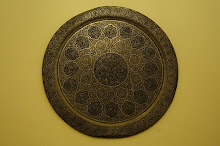The Kasidah is a poem written by the 19th century British adventurer and writer, Richard Francis Burton, under the pseudonym Haji Abdu El-Yezdi. The title comes from a pre-Islamic form of Arabic lyrical poetry called 'Qasidah'. The word means 'intention' or 'testament' and traditionally recounts stories about travel or caravans, as Burton's does. The poems usually have three parts, a retrospective opening, a travel-transition during which transformations occur, and a final message.
Although we are not well trained to read this kind of poetry any more, a slow intake of the words can begin an appreciation of this underrated form of expression. Here is a short passage from 'The Kasidah' (the full poem can be found at "The Kasidah"):
'Believe in all things; none believe;
judge not nor warp by "Facts" the thought;
See clear, hear clear, tho' life may seem
Maya and Mirage, Dream and Naught.
Abjure the Why and seek the How:
the God and gods enthroned on high,
are silent all, are silent still;
nor hear they voice, nor deign reply.
Cease, Abdu, cease! Thy song is sung,
nor think the gain the singer's prize;
Till men hold Ignor'ance deadly sin
till man deserves his title "Wise".
In Days to come, Days slow to dawn,
when Wisdom deigns to dwell with men,
These echoes of a voice long stilled
haply shall wake responsive strain:
Wend now thy way with brow serene,
fear not thy humble tale to tell:
The whispers of the Desert-wind;
the tinkling of the camel's bell.'
(second image is a lithograph print of the Island of Graia in the Gulf of Aqaba by David Roberts, the famous 19th century illustrator of the Middle East)















No comments:
Post a Comment